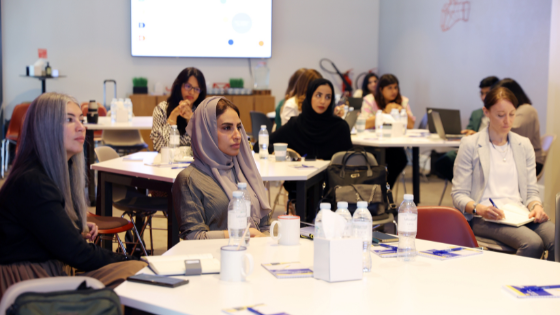
Women Empowerment Principles
One of the key learnings from the COVID-19 pandemic is that there is a disproportionate impact on women in times of unprecedented catastrophes, therefore having a complacent mentality with regards to the rate of progress of gender equality can have detrimental effects on the safety and security of women not just in the workforce but in our societies.
Although there seems to be a consensus that great strides have been made with regards to gender equality in recent years, only 8.8% of Fortune 500 companies have women CEOs. Therefore, the efforts conducted by various global organizations with regards to promoting the importance of gender equality is still more important than ever.
On October 26th 2022 and subsequently December 7th 2022, the Pearl Initiative was invited to attend a two-part course on Women Empowerment Principles (WEPs) hosted by UN Women. The sessions were facilitated by humanitarian, corporate leader and social entrepreneur Noha Hefny and Diversity and Inclusion strategic advisor and UN Women consultant Dr. Maya Rmeity. The attendees consisted of Diversity and Inclusion professionals from a wide variety of companies and sectors across the UAE.
The session started off with some sobering statistics on the extent of the gender gap across the main regions of the world. Although statistics usually are clinical in nature and are hard to comprehend in most circumstances, I believe that the number 132 stood out to each attendee in the room. 132 is the number of years it will take to achieve global gender parity if progress continues at the current rate. For the Middle East in particular, gender parity will be achieved by the year 2137, 115 years from now. It seems unfathomable that it would require more than a century’s worth of effort to achieve something so rudimentary and fundamental as gender equality.
Another statistic that stood out was that 53.5% of barriers for women to be a part of leadership in the GCC was due to a lack of support from their organizations. This statistic emphasized the importance of the role of Diversity and Inclusion professionals to aid in the cultural shift required to better position women for leadership positions within each of their organizations.
The course then progressed to discuss the actual principles designed to empower women in their career progression; these principles are:
- Principle 1: Gender-equal Corporate Leadership, which emphasizes the need for high-level support for gender equality and Human Rights by corporate leadership.
- Principle 2: Gender Equality in the Workplace, which highlights the need for non-discrimination policies and equal pay and benefits etc.
- Principle 3: Employee Health and Safety, which highlights the need for safe-working conditions and zero-tolerance towards violence and harassment
- Principle 4: Education and Training, which emphasizes the need for equal access to education and training programs.
- Principle 5: Enterprise and Supply Chain Development which states the need and importance to procure from women-owned/ led enterprises.
- Principle 6: Equality through Community, which emphasizes the importance of social impact and responsibility through activities and commitments.
- Principle 7: Measurement and Reporting, which details the need to have plans and policies in place to promote gender equality.
The session also had a variety of case studies to further explain each of these principles in a simplified and practical manner that allowed the audience to achieve a deeper understanding on the applicability of these principles in each of their organizations. Overall, this Women Empowerment Principles course allowed the attendees to break down the various methods in which they can help drive gender parity in their individual companies.
I left the meeting feeling a sense of pride in the enthusiasm shown by the different Diversity and Inclusion leaders in attendance and it reignited the sense of hope for the future generation of female professionals. The course also helped me reflect on the importance of the work of the Diversity in Business Leadership Programme at Pearl Initiative and how every awareness session, convening, training, and research conducted, as part of the Programme, helps contribute towards a more equal, inclusive, and equitable workplace across all sectors of the Gulf region and the Middle East.
